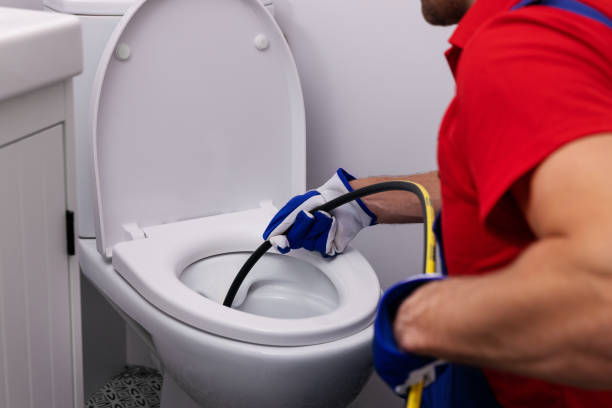Do you ever wonder why your toilet gets clogged from time to time? It can be frustrating, especially when you’re in a hurry or have guests over. Well, there are a few common reasons why toilets get clogged, and understanding them can help you prevent future blockages. One of the most common culprits of toilet clogs is excessive toilet paper usage.
Yes, that soft and fluffy paper we all love can be the reason behind your clogged toilet. Using too much toilet paper in one flush can overwhelm the plumbing system, causing a blockage. Additionally, some toilet paper brands are thicker and less biodegradable, making them more likely to cause clogs.
So, next time you reach for that extra handful of toilet paper, remember to use it sparingly to avoid potential clogs. But excessive toilet paper usage is not the only reason toilets get clogged.
Excessive Toilet Paper Usage
You might be surprised by how easily your toilet can get clogged if you’re using way too much toilet paper! Using a generous amount of toilet paper may seem harmless, especially if it’s soft and fluffy. However, excessive toilet paper usage is one of the main culprits behind toilet clogs.
When you flush the toilet, the excess toilet paper can clump together and create a blockage in the pipes. This can lead to a slow drain or a complete backup, causing water to overflow and creating a messy and inconvenient situation. To prevent clogs caused by excessive toilet paper usage, it’s important to practice moderation.
Remember, you only need a reasonable amount of toilet paper to get the job done. Instead of folding or wadding up large amounts of toilet paper, try using a smaller amount and fold it neatly. This will help prevent the paper from clumping together and causing a blockage.
Additionally, consider using thinner or less absorbent toilet paper, as it’s less likely to create a clog. By being mindful of your toilet paper usage, you can avoid unnecessary clogs and keep your toilet functioning smoothly.
Flushing Inappropriate Items
Flushing things that shouldn’t go down can lead to a messy situation. You’re asking for trouble when you flush inappropriate items down the toilet.
Here are some items that should never be flushed down the toilet:
- Baby wipes: Despite what the packaging might say, baby wipes aren’t flushable. They don’t break down like toilet paper and can easily clog the pipes.
- Feminine products: Tampons and pads are designed to absorb moisture, not to disintegrate in water. Flushing them down the toilet can cause blockages and backups.
- Dental floss: Dental floss is thin and may seem harmless, but it can wrap around other debris in the pipes and create a solid mass that stops the flow of water.
- Medications: Flushing expired or unused medications down the toilet can contaminate the water supply and harm the environment. It’s better to dispose of them properly at a designated collection site.
Remember, the toilet is only meant for human waste and toilet paper. Flushing anything else can result in costly repairs and a lot of frustration.
Low-Flow Toilets and Narrow Pipes
Due to the design of low-flow toilets and the narrowness of pipes, certain items can cause obstructions and hinder the flow of water. To conserve water, low-flow toilets use less water per flush compared to traditional toilets. While this benefits the environment, it can also lead to problems.
There may need to be more than the reduced amount of water to effectively push waste and debris through the pipes, resulting in clogs. Additionally, the narrowness of the pipes in some plumbing systems can further exacerbate the issue. When items that are not meant to be flushed, such as feminine hygiene products, paper towels, or excessive amounts of toilet paper, are introduced into the system, they can easily get stuck in the narrow pipes, leading to clogs.
To prevent clogs caused by low-flow toilets and narrow pipes, it is important to be mindful of what gets flushed down the toilet. Avoid flushing items that are not designed to break down easily, such as baby wipes or dental floss. Instead, dispose of these items in the trash.
Using only the necessary amount of toilet paper is also a good practice, as excessive amounts can contribute to clogs. If you are unsure whether an item is safe to flush, it’s best to err on caution and dispose of it in the trash. By being aware of the limitations of low-flow toilets and narrow pipes and taking steps to prevent obstructions, you can help ensure a smooth and efficient water flow in your toilet system.

